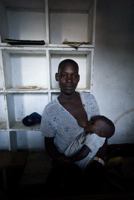This blog posts any and all news related to Female Genital Cutting (FGC). It tracks only content that discusses FGC as a main subject. The page is designed as a resource for researchers and those who want to keep up to date on this issue without slogging through google alerts or news pages. Original authors are responsible for their content. To suggest content please write to fgcblogger@gmail.com. FGC is also called female genital mutilation or FGM; FGM/C; or female circumcision.
Search This Blog
Monday, December 21, 2009
'I Feel Like Less of a Woman'
December 12, 2009
By Jessie Boylan - Inter Press Service News Agency
MUSOMA, Tanzania, Dec 12 (IPS) - In the darkest corner of the room, under the clamour of twelve women’s voices, sits Ghati Chacha (not her real name), she can barely be heard. Her newborn suckles as she speaks softly about how she refused female circumcision.
"I refused because (the previous) President Mkapa had banned circumcision in Tanzania," she said. After this, however, Chacha was forced to marry an 80-year-old man because, according to the local Kurya custom in the Mara district of northern Tanzania, she was no longer suitable for a man of her own age.
"I was forced marry by my father," she said. "I tried to refuse, but my father ordered me to leave home. He was paid only 12 cows for my marriage."
It becomes obvious that Chacha is the only one in the room who is uncircumcised and her story is cut off as the other women in the room shout to be heard.
"The young men laugh at each other if they marry an uncircumcised woman," said Mondesta Mugaya, a 65-year-old woman, who used to perform circumcision in Kitarmanka Village in the Musoma rural district.
"And the uncircumcised girls are still considered to be children," she said. "At traditional ceremonies, uncircumcised women aren’t allowed to be there.
"I don’t believe in circumcision for girls anymore, but without it girls sleep around a lot."
In Mama Regina’s office at the Catholic Diocese of Musoma, Bhoke Mwita* is smiling. She’s sitting on a wooden chair swinging her legs and fiddling with her mobile phone. In 2004 she and her two children found refuge here.
"My husband died in 2003," she said, "and I was supposed to be inherited by my husband’s brother, but I refused. I said I needed time to think about it. Then I ran away."
It was Mama Regina Andrew who, not long after she had started an FGM campaign with the diocese, found Mwita in her village seeking help. As the assistant for the Women in Development (WID) programme, Mama Regina has helped 36 girls escape FGM, and another 90 women from problems like domestic abuse and forced marriage.
"It is one of the biggest ceremonies in Kurya tradition," said Mama Regina. "Some 95 percent of girls are still being circumcised in the Tarime District.
"The law is against FGM, but we don’t know how the government is dealing with these issues," she said.
The tradition was banned in 1998, but it is deeply embedded, and according to the Diocese it is only in the past 10 years perceptions have started to change.
Mama Regina and some Sisters regularly visit villages to hold public meetings and events, they also initiate working groups to provide information about women and children’s rights, particularly the effects of FGM.
"It wasn’t an easy task, because women are seen as not the same as men, not as important. The women do a lot of work, at home, in the farm, with the children, but it is the men who are the beneficiaries," she said.
"You see, girls are seen as generating income for the family," said Mama Regina. "Parents don’t see the reason to send girls to school because they won’t receive the dowry when the girl is married. They think it will make the family poor."
Mama Regina believes that FGM will take many years to die out among the Kurya. "It’s a kind of religion," she said.
"We started the big FGM refugee camp just outside of town here as a place for the girls to get counseled, as well as somewhere for them to run to when they escape from their communities," she said.
"When the girls go back to their communities they say ‘Thank you for this tradition, because I fled, and now I’m educated’. The families see them speaking with confidence, without fear and this helps them realize the importance of stopping FGM.
"I believe that it will take time to change, but one day soon it will be a shame to be circumcised."
According to Mama Regina, when Mwita arrived at the diocese she was very thin, nervous and softly spoken. Now, said Mama Regina, she has gained a lot of confidence, strength, and weight, and is completing secondary school.
Through the WID program, Mwita herself now runs micro-finance programs for women in villages to start businesses such as farming, bakeries and clothing shops. She also speaks at public forums and educates about the effects of FGM.
"When I go back to my village," said Mwita, "people respect me and they are cautious about what they say to me. But it is like bringing Western values in, and I am aware of the difference.
"Life is different for me now, it’s better to be here (in town) than in the village. Now I am strong, unafraid, and can fight for my rights."
